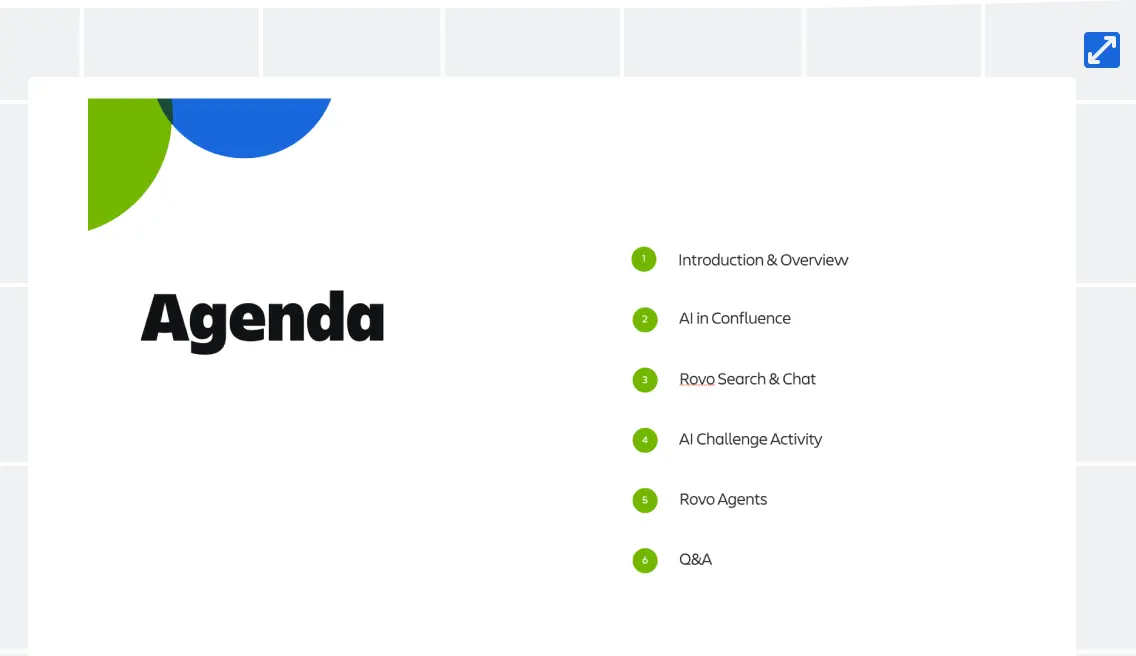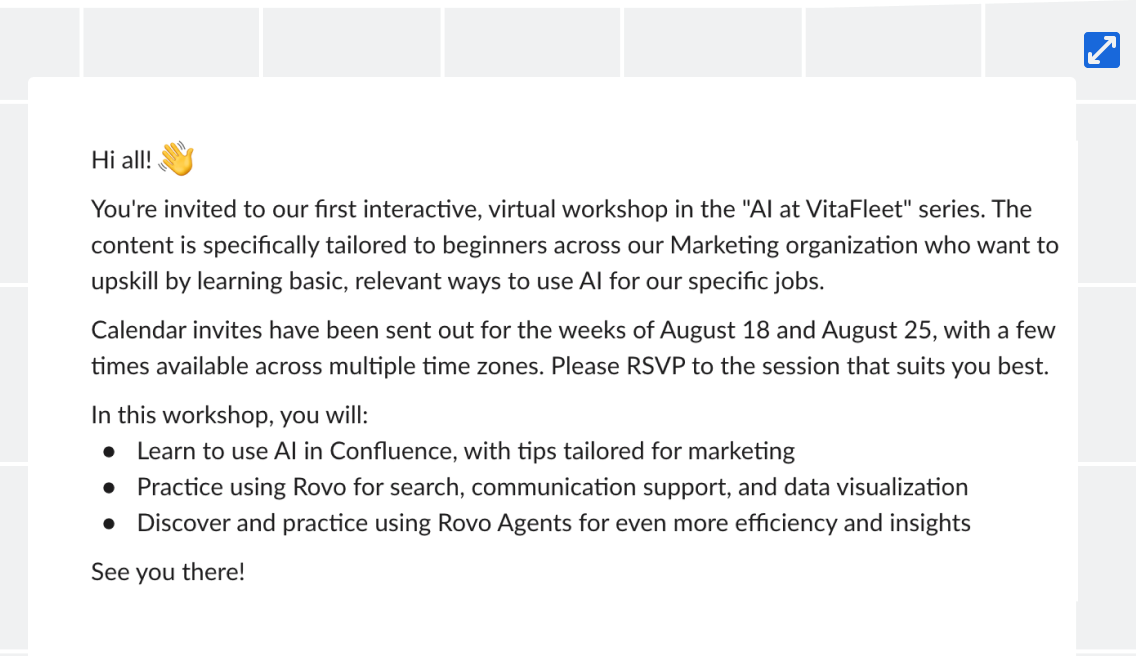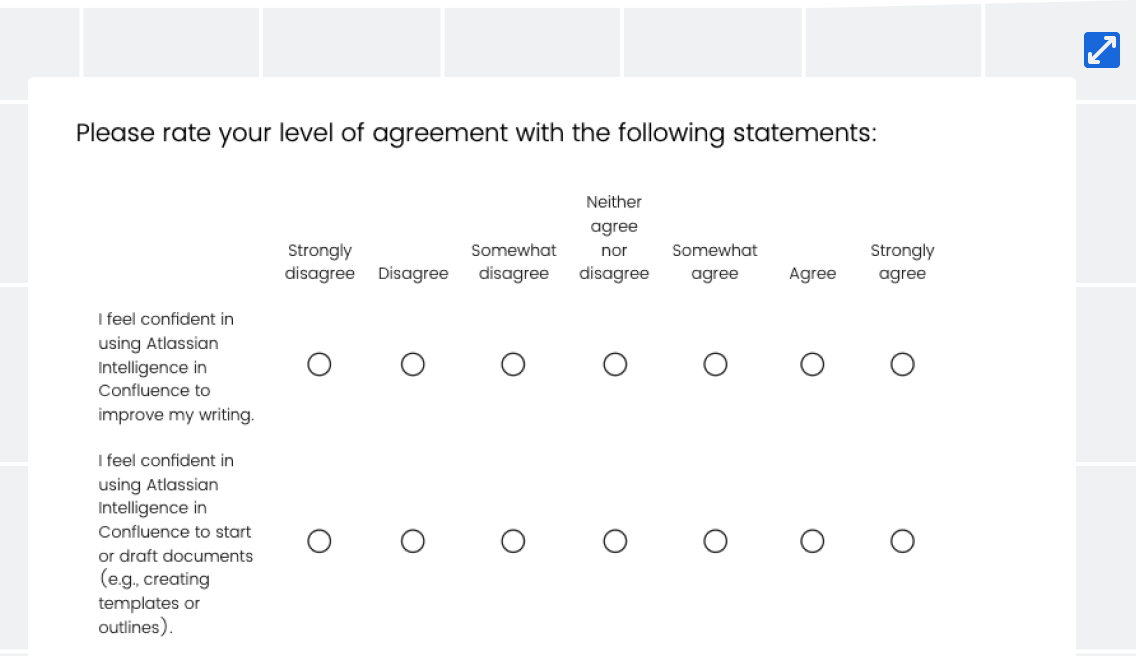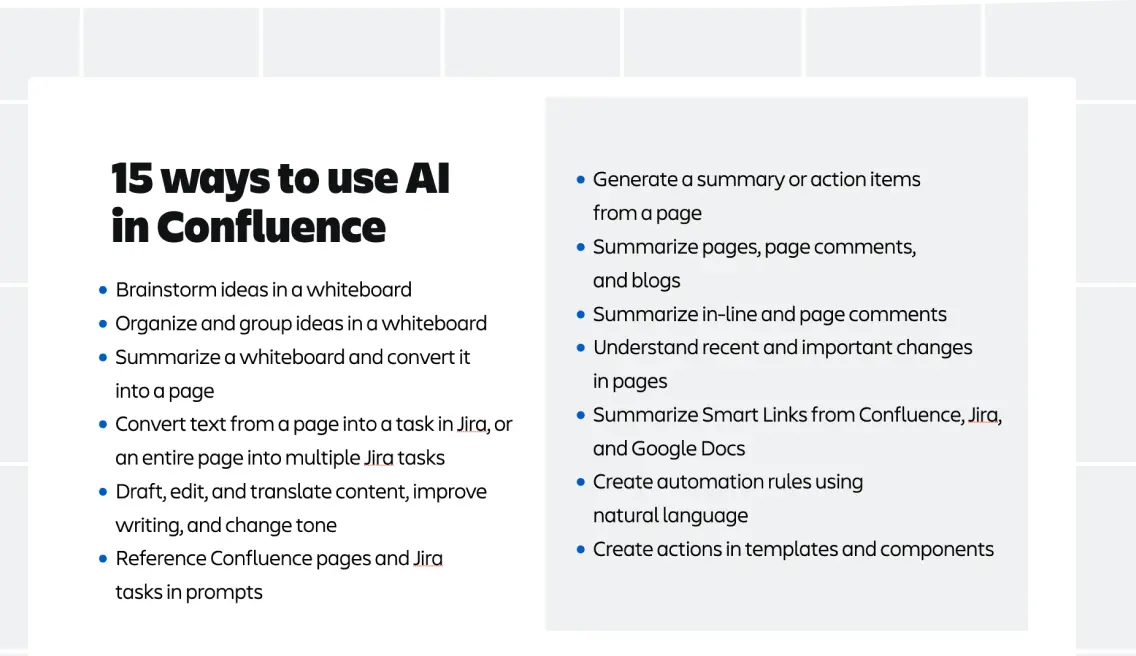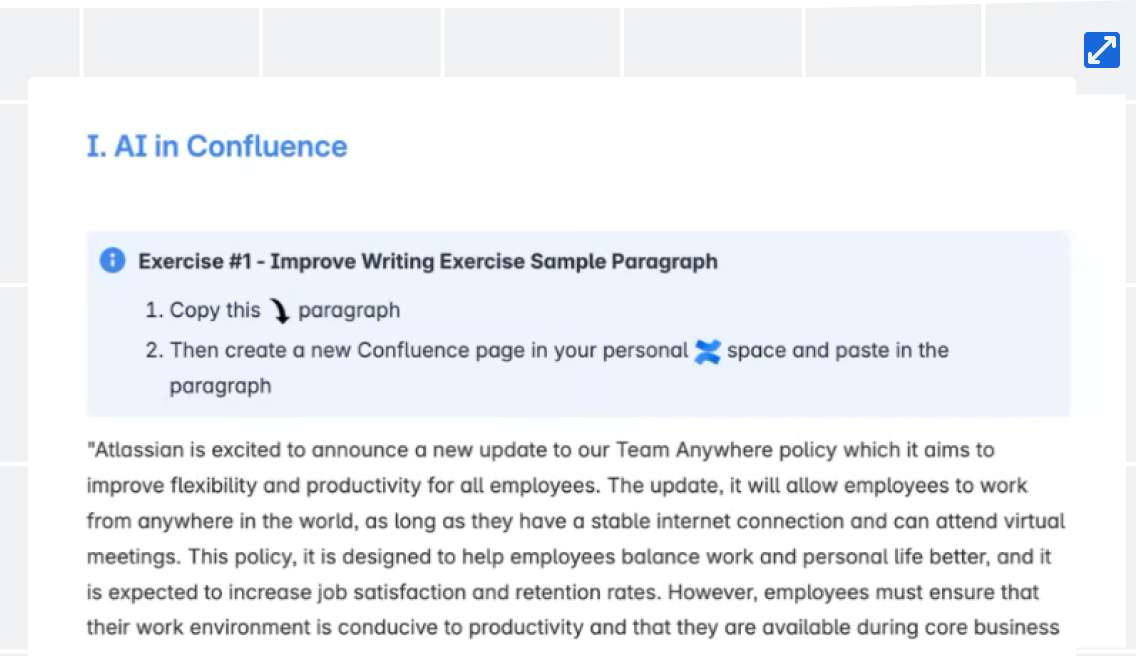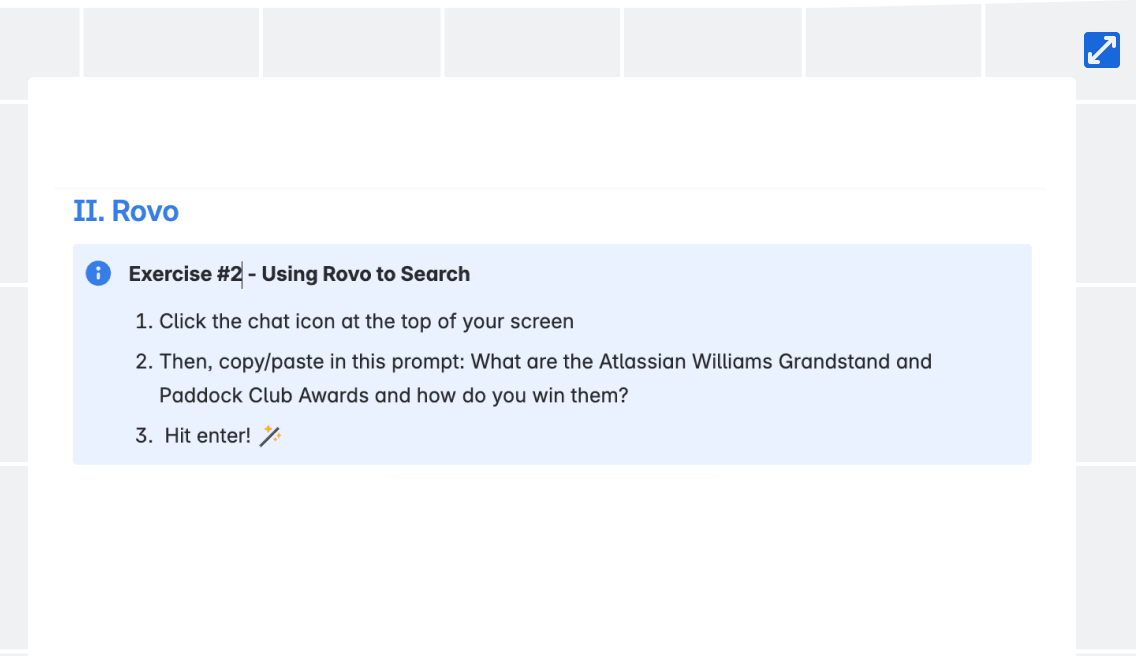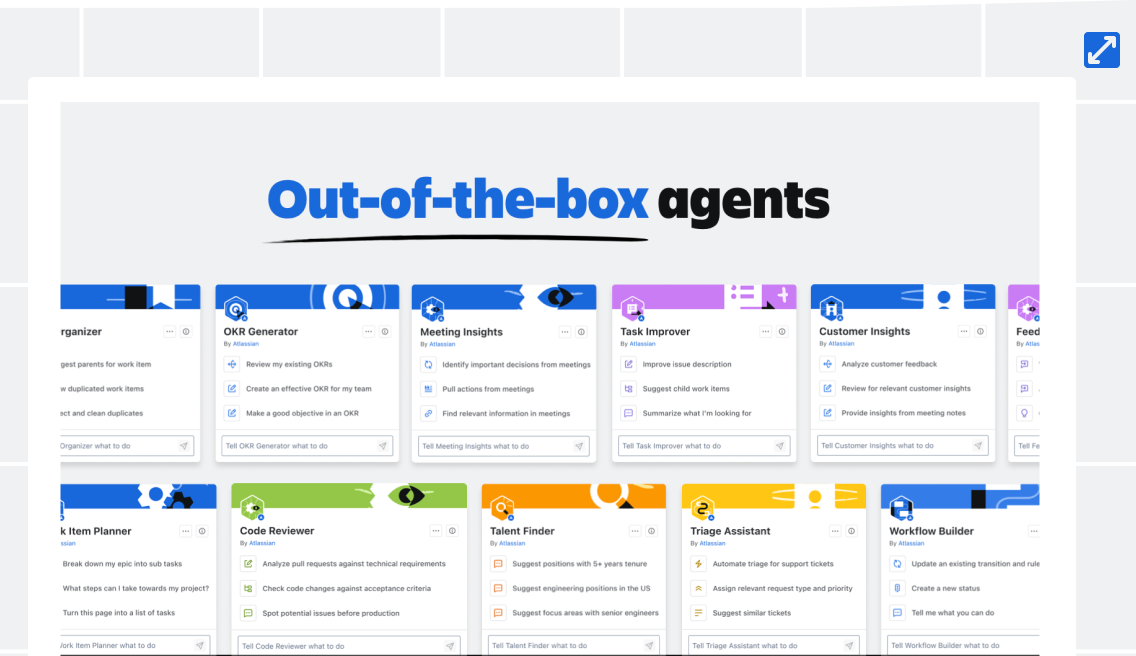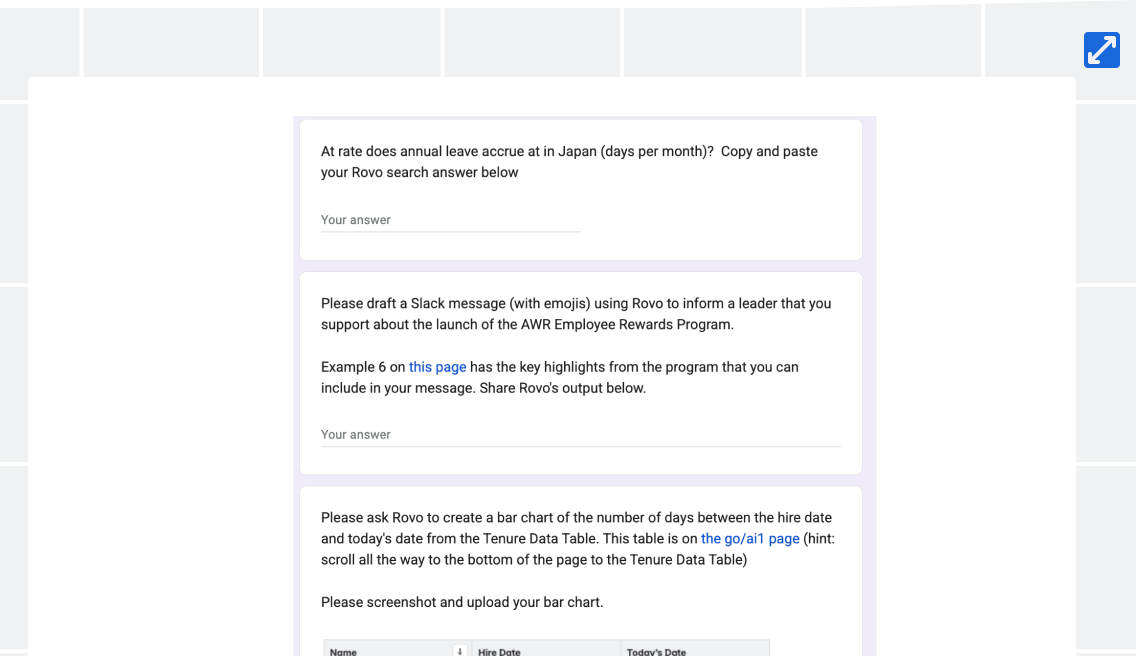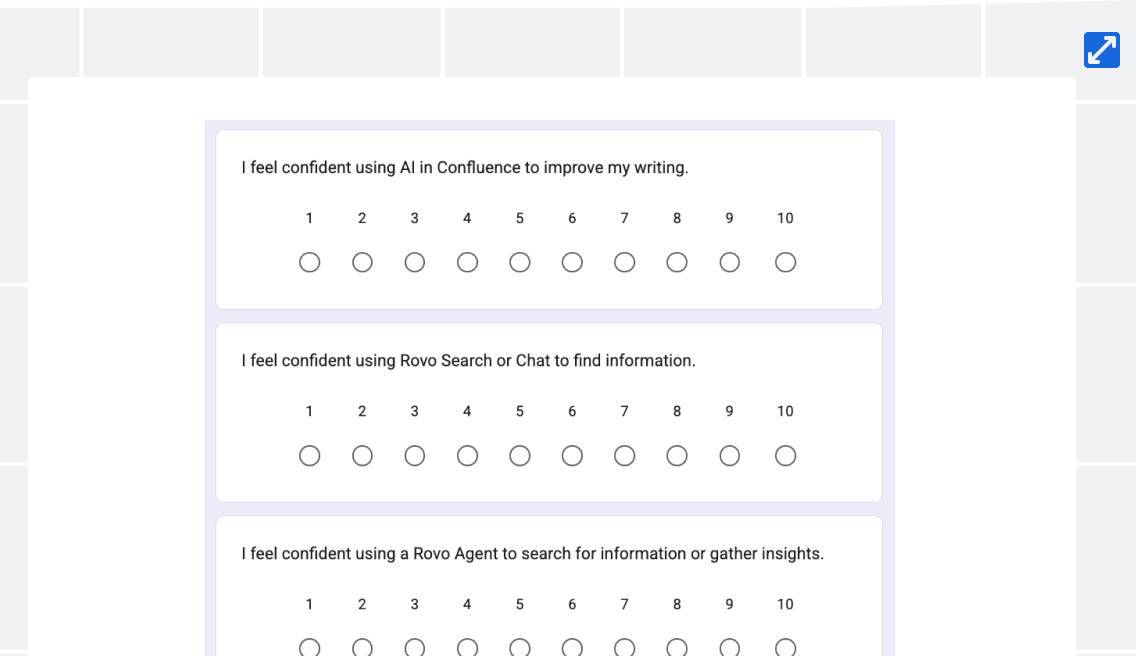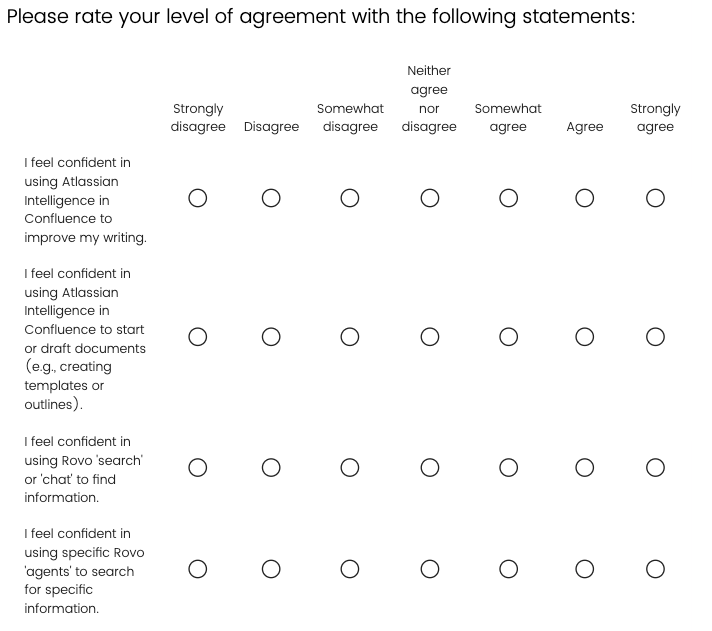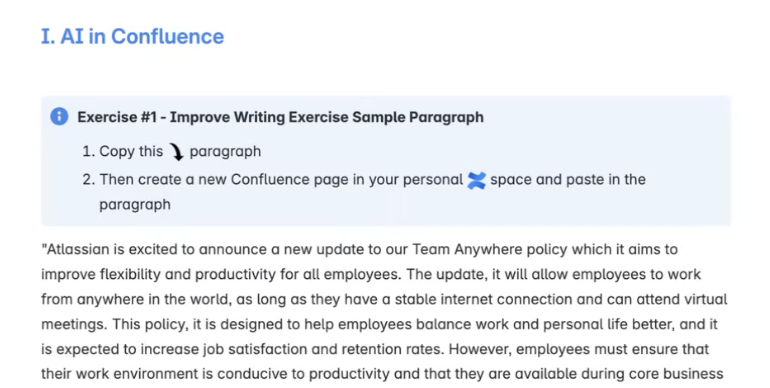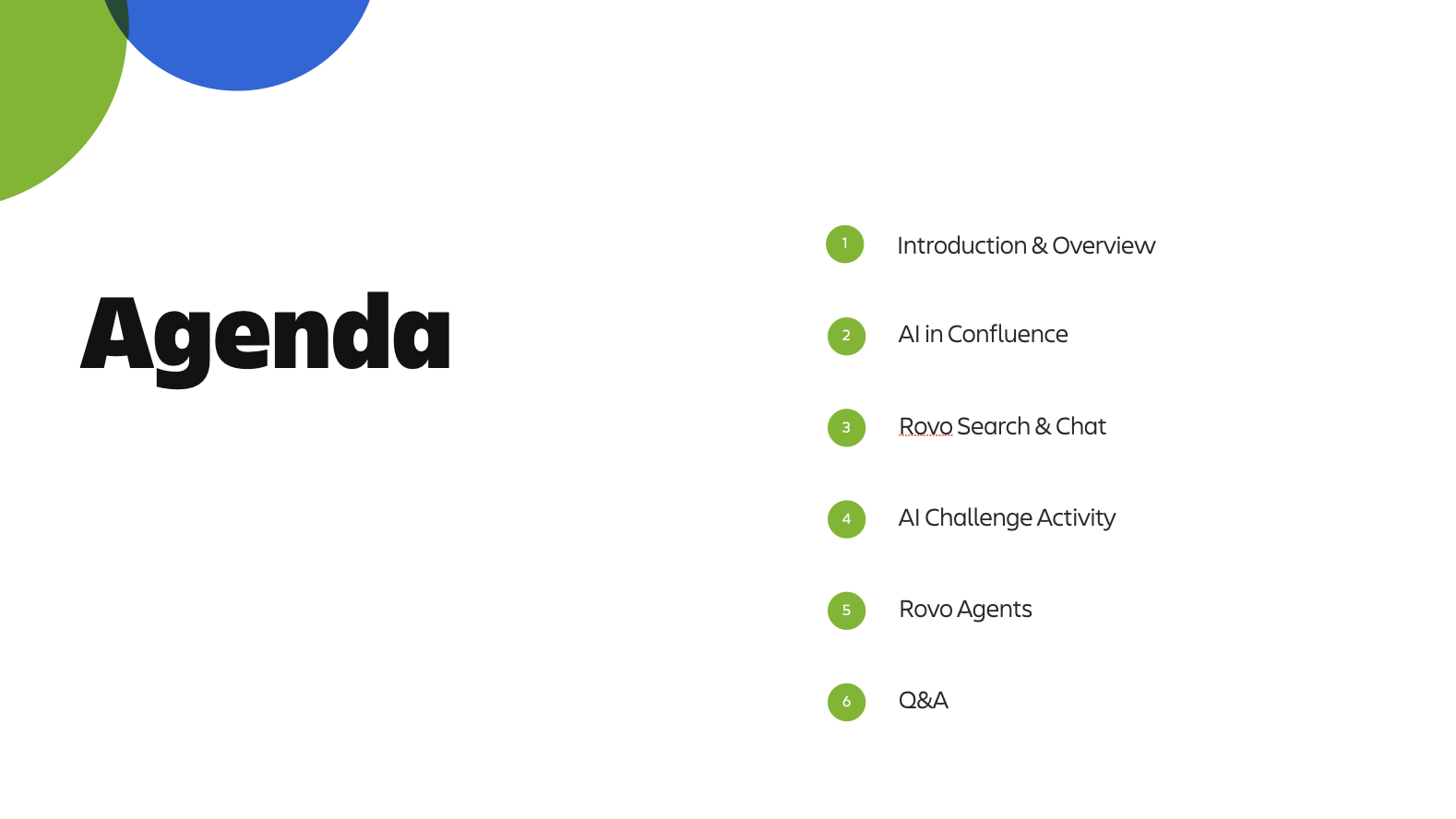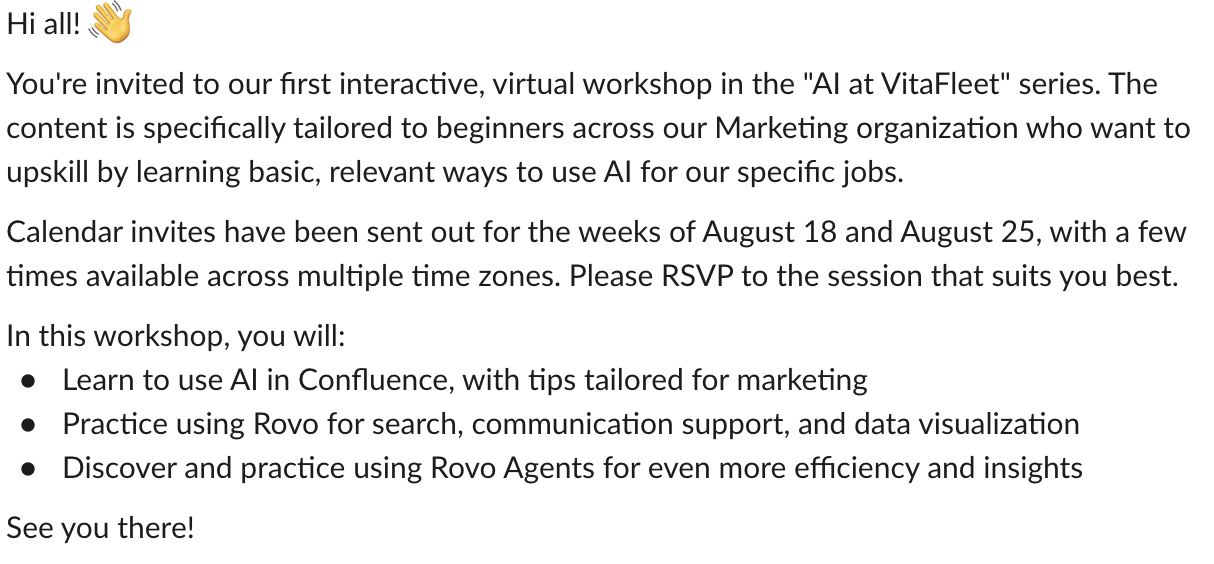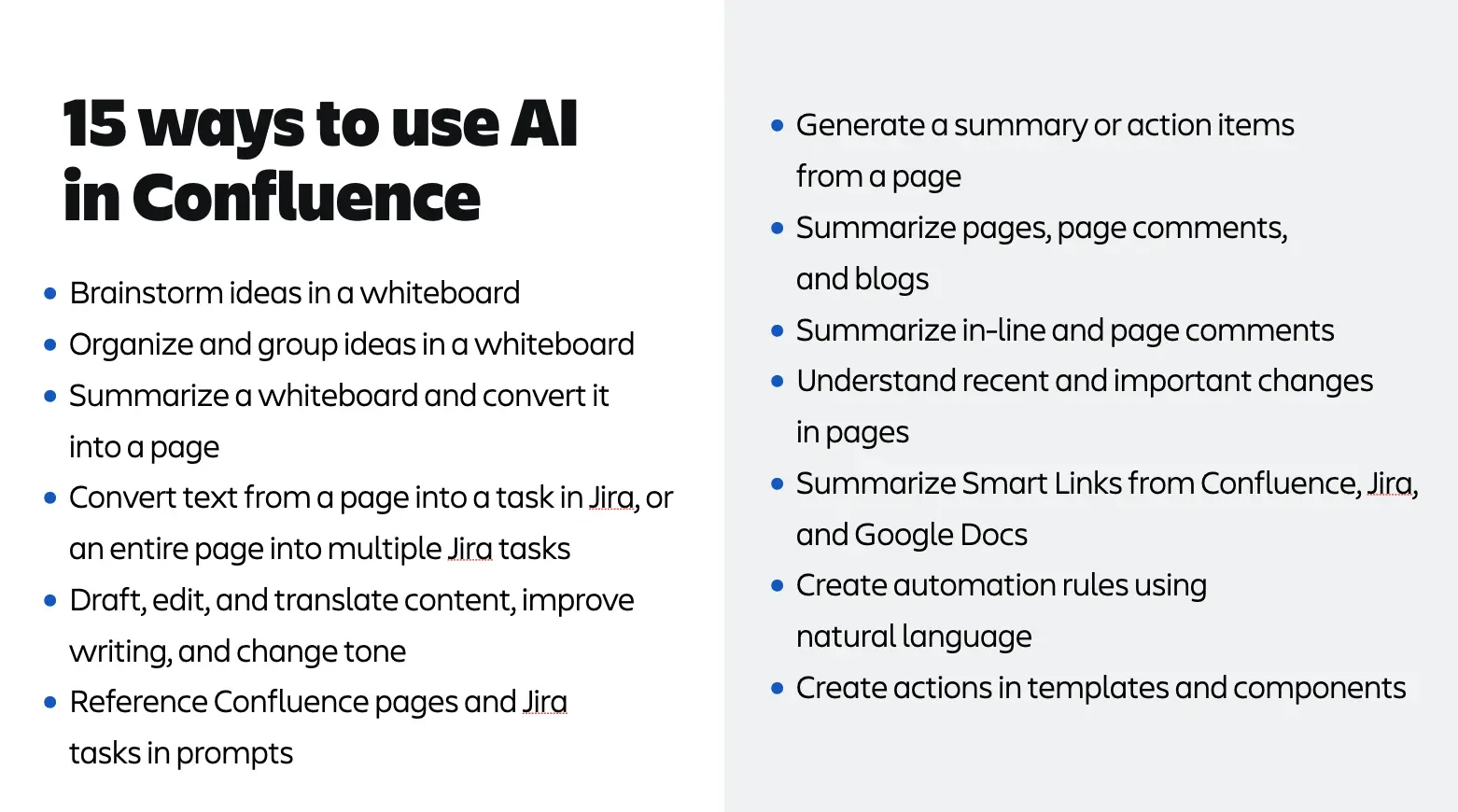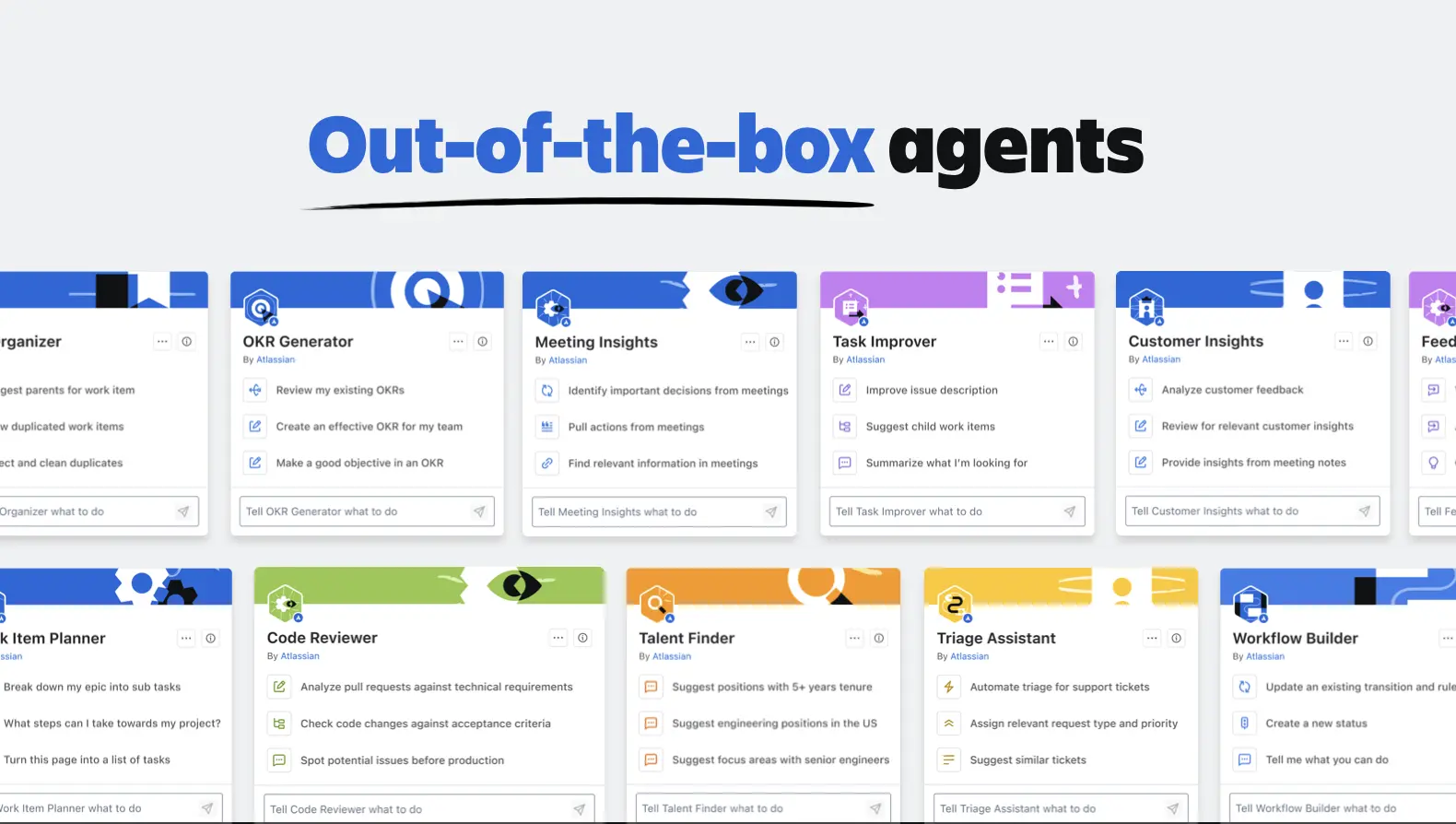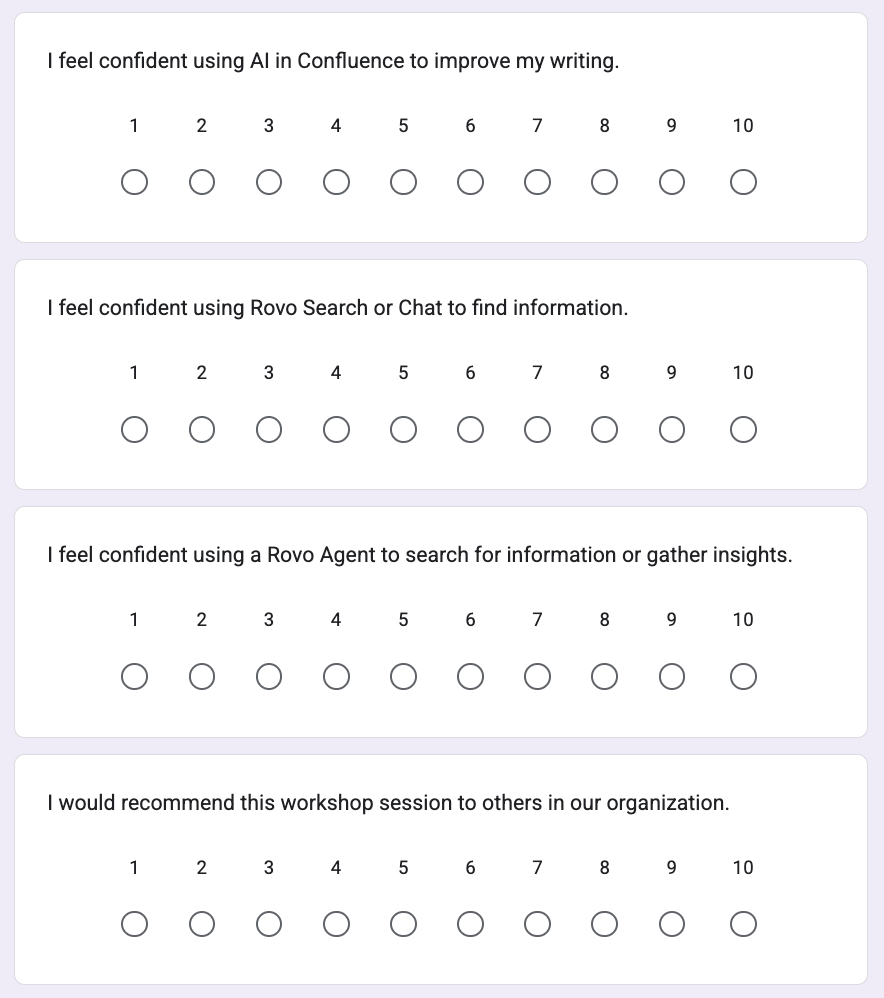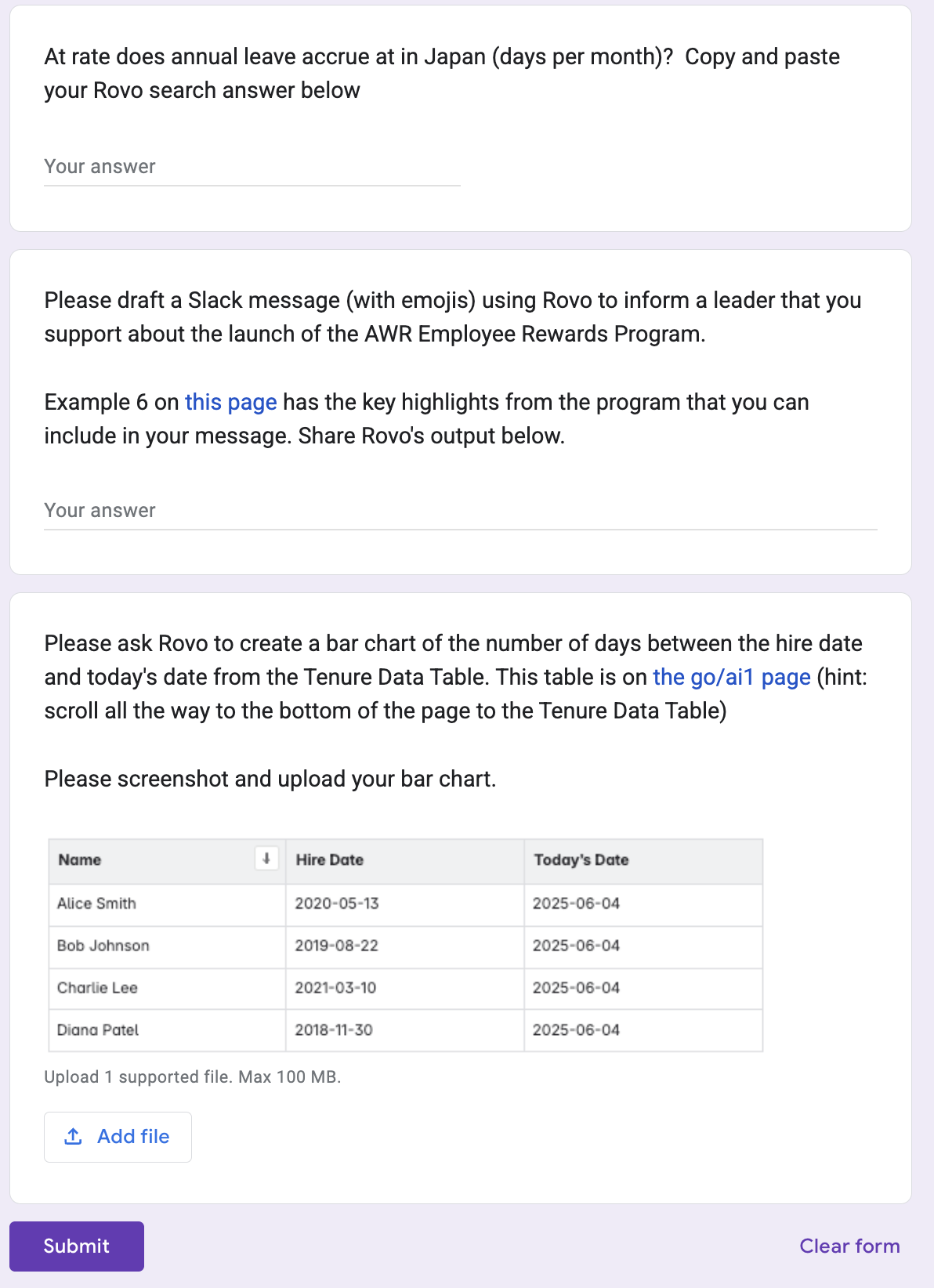AI Training Workshop
Run a workshop to help anyone learn the basics of how to use AI at work to save time, build knowledge, and create new value.

PREP TIME
2-3hr
Run TIME
1hr
Persons
2+
5-second summary
- Identify an AI sponsor and champions who can support education and adoption.
- Plan an AI Training Workshop for beginner business users.
- Facilitate the workshop to help team members upskill by learning basic, relevant ways to use AI for their specific jobs.
WHAT YOU WILL NEED
- Meeting space or video conferencing with screen sharing
- AI tool, such as Atlassian’s AI and Rovo
- Survey or form tool like a Google form, Zoom survey, Typeform, or Qualtrics
- Digital presentation
- Optional: A prize for the winner of the interactive activity
How to run an AI Training Workshop
Run a workshop to help anyone learn the basics of how to use AI at work.
What is an AI Training Workshop?
Many people are intrigued by AI, but don’t know where or how to start. This interactive training session helps beginners in less technical roles across a business (e.g., Marketing, HR, Sales, Legal, Finance, etc.) upskill by learning basic, relevant ways to use AI for their specific jobs.
Why run the AI Training Workshop Play?
So you’re excited about implementing AI at work, but how do you get other people excited and equipped? By showing how they can benefit and teaching them how to use it.
People learn best by watching, then doing. This Play walks anyone (not just Learning & Development professionals) through how to run an effective AI Training Workshop that teaches beginners how to start using AI in their daily work.
When should you run the AI Training Workshop Play?
While it’s never too early or too late to do an AI Training Workshop, the best time is when team members have onboarded to the new AI tool(s) and had some time to test them out. That way, people have a basic level of familiarity and are ready to learn more.
3 benefits of running the AI Training Workshop Play
Practical experience: Workshops require participants to immediately implement the skills they are learning, which helps reinforce knowledge and build confidence.
Customized content: Workshops can be easily adapted to meet the specific needs of participants, making them more relevant and timely compared to traditional lectures.
Positive outcomes: Data from workshop participants across fields consistently show high performance, high satisfaction, increased likelihood of applying knowledge, and strong recommendations for the format.
1. Identify sponsors and champions
Est. time: 15 MINs
Whenever there’s a big change or opportunity – whether it’s a new tool, strategy, or other initiative – enlisting the help of sponsors and champions is one of the best ways to gain buy-in and support success.
As you start planning your AI Training Workshop, identify at least one leader who can serve as a sponsor and at least one person within each department or Center of Excellence who can serve as a champion. Collaborating with leaders and their peers to nominate champions tends to result in greater engagement, especially over the long term, vs. asking champions to volunteer.
Champions can fill one or multiple roles:
|
| AI Super User | AI Training Workshop Facilitator | AI Liaison |
|---|---|---|---|
|
| AI Super User AI Super User | AI Training Workshop Facilitator AI Training Workshop Facilitator | AI Liaison AI Liaison |
| Technical experience with AI | AI Super User
| AI Training Workshop Facilitator
| AI Liaison
|
| Facilitation experience | AI Super User
| AI Training Workshop Facilitator
| AI Liaison
|
| Enthusiasm for AI and willingness to communicate between leaders and teams | AI Super User
| AI Training Workshop Facilitator
| AI Liaison
|
While the ideal scenario is to find one or a few champions who can fill all of these roles, you can also engage multiple champions who each fill a unique role.
For example, Maria might have technical experience and enthusiasm for AI, but not facilitation experience. Her teammate, Zena, might be a strong facilitator, but doesn’t know as much about AI. They could partner as champions for this initiative and workshop.
Tip: Choose advocates as champions, not admins
While admins of AI tools might seem like a good fit to be champions, they tend to have “the curse of knowledge” and be biased due to their level of expertise. Since the goal of this workshop is to help less experienced users learn about AI, we recommend choosing a champion who is not an admin so they can relate more to workshop attendees and better support them as they learn the basics.
2. Determine learning objectives
Est. time: 10 MIN
Like any effective plan, this workshop should start with a goal. What do you want people to learn? What should they be able to know and do by the end?
For example:
We want participants to learn:
- What AI tools are available to them
- Specific, relevant ways to use AI for their specific jobs
The basics of how to use our approved AI tool(s) to elevate productivity and success
By the end of the workshop, participants should feel confident using our approved AI tool(s) in at least two valuable ways.
Share these learning objectives with your champions to get their feedback and confirm if your plans align with the team’s real-world needs.
3. Build workshop content
Est. time: 2 hrs
There are many ways to approach designing the agenda for this workshop. At a minimum, we recommend including:
- An opening from your sponsor and/or leader
- An opening survey using a basic tool like a Google form, Zoom survey, Typeform, or Qualtrics to gauge baseline confidence
- A walkthrough of 2-3 high-priority use cases for your AI tool(s): one basic, one intermediate, and/or one more advanced
- An interactive activity to encourage hands-on practice in a fun, engaging way
- A closing survey completed before the Q&A to gauge participants' change in confidence using your AI tool(s)
- Q&A
-
A closing from your sponsor and/or leader
Create a presentation to guide the conversation and serve as a visual resource during the training. You can use Atlassian’s AI Training Workshop presentation as an example.
Once a draft is ready, share it with your champions to get their feedback and make changes where needed.
Also, collaborate with the facilitator to ensure they are familiar with the material and feel confident delivering the workshop. Doing a practice run shortly before the session helps minimize issues.
4. Make a guest list, and send invitations
Est. time: 20 min
The AI Training Workshop is geared toward upskilling beginners who work in less technical roles (e.g., outside of engineering and development). Because the content is so simple, it doesn’t require a professional facilitator or Learning & Development to lead, and the guest list can be any size.
While this workshop can be done in person or virtually, it’s most effective when done live with a facilitator. If you have a global company, aim to host at least one session for each region (North America, Asia Pacific, and Europe/Middle East/Africa). You can also record the session for anyone who can’t attend live.
Ideally, the invitation should come from the leader or sponsor to set the tone that this is a priority for the company or team, and to encourage participation.
In addition to sending a calendar invitation, ask the sponsor to make an announcement through your team’s communication channels (e.g., Slack, Teams, Confluence, Loom, email, etc.) to get people excited and give them permission to take the time to attend.
tip: Plan around schedules and time zones
Avoid busy times of year when people will have limited capacity, and offer sessions at different times to accommodate distributed teams.
Practice run the day before to make sure everything goes smoothly and sections were at time
5. Open the workshop with an intro and survey
Est. time: 5 min
Ask your sponsor and/or leader to open the workshop with a few words about the purpose of the session, what real-world skills attendees can expect to learn, how participants will benefit, and a personal example of how the sponsor/leader uses AI in their work. This helps lead by example and give attendees “permission” to use AI (in approved ways) as a teammate.
Then, ask attendees to complete a basic survey to gauge their familiarity and confidence with the AI tool(s) so you can measure success later.
6. Walk through a basic AI use case
Est. time: 10 min
Start with your more basic AI use case. For example, for Atlassian users, the first use case could be using AI within Confluence to improve the writing of a simple paragraph.
Apply a “show, then do” approach, where the facilitator shows attendees how to complete a task or workflow first, and then they do it themselves. The facilitator(s) can walk around the room or visit virtual breakout rooms to answer questions and provide hands-on support.
tip: Prep to minimize technical issues
Record a video of the AI use cases using a tool like Loom in case the live demo isn’t working. If you have a large group attending in person, let IT know you may need higher bandwidth during the workshop.
7. Walk through an intermediate AI use case
Est. time: 20 min
Then, repeat the same “show then do” approach for an intermediate use case, such as using Rovo Search or Rovo Chat to write, read, review, or create things the same way you might ask a real person.
Again, the facilitator(s) can walk around the room or visit virtual breakout rooms to answer questions and provide hands-on support.
8. Walk through a more advanced AI use case
Est. time: 20 min
Finally, repeat the same approach for a more advanced use case. For Atlassian users, this could be using a Rovo Agent that’s relevant to their work (either an out-of-the-box agent or a custom agent built by someone on the team).
Again, the facilitator(s) can walk around the room or visit virtual breakout rooms to answer questions and provide hands-on support.
9. Time to play
Est. time: 15 min
Including an interactive activity or game in your AI Training Workshop not only helps keep people engaged but also helps them practice their new skills.
For instance, you could do a scavenger hunt or a quiz like this using a basic form or worksheet.
tip: Award a prize
Offering a prize, such as a gift card or company swag, to a few lucky winners can boost participation and engagement in the interactive activity.
10. Share a closing survey
Est. time: 5 min
Tell attendees about resources available to continue their learning and ask them to complete a closing survey to gauge their takeaways, satisfaction, and feedback for future sessions.
11. Q & A
Est. time: 5 min
Save at least 5-10 minutes at the end of the workshop for questions. It can be helpful to have an AI expert join you for this part so they can answer any technical questions.
tip: Measure success
In your closing survey, ask questions related to confidence using the AI tool and their satisfaction with the training. After the session, you can also measure workshop attendance and AI usage (such as weekly or monthly average users) to gauge whether attendance led to increased usage.
12. Appreciate and evaluate
Est. time: 5 min
Once you learn how to use AI, it’s time to start applying new knowledge and building habits. Ask your sponsor and/or leader to thank everyone for their participation in the workshop, recap key takeaways, and share a call to action (like using AI in one of the ways discussed this week).
Follow-up
Provide resources and community
Like any training or education, the AI Training Workshop isn’t “one and done.” Behavior change is often the toughest part. Offer ways for attendees to continue learning and practicing, such as:
- An AI Slack or Teams channel where people can share ideas and ask questions
- An AI hub within your collaborative workspace (such as Confluence) where they can find a copy of the training presentation and other educational resources
Office hours to get answers to their questions
Ask attendees to share progress
A week or two after the workshop, ask the sponsor or leader to follow up with attendees to see how they’re doing with their new knowledge and skills. For example, ask them to post a message in the team chat, such as “How has your AI practice been going? Drop an example in the thread about how you’ve used AI this week and how it worked for you!”

Still have questions?
Start a conversation with other Atlassian Team Playbook users, get support, or provide feedback.
Other plays you may like
Optimize with AI
AI Innovation Day
Get the most out of GenAI with a focused day of learning and doing.
Optimize with AI
AI Teammate
Build your first AI agent
Stay up to date
Get the latest Plays and work life advice when you sign up for our newsletter.
